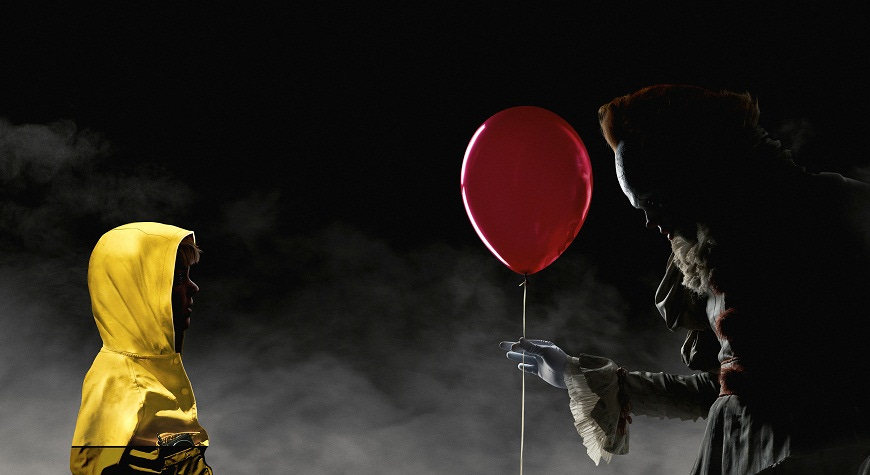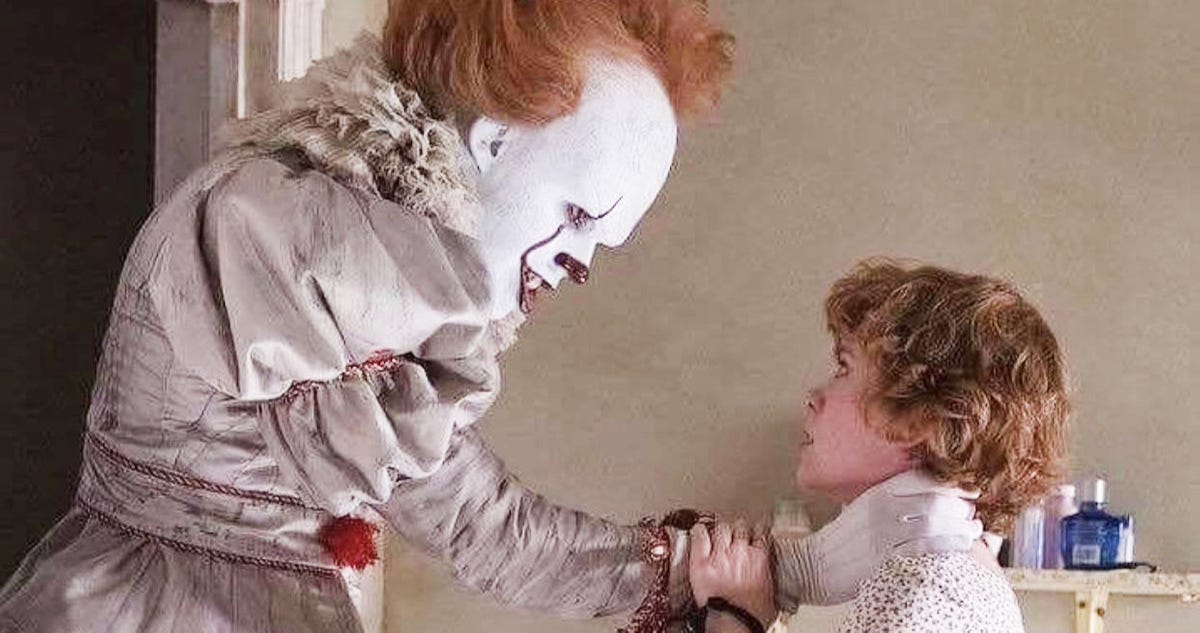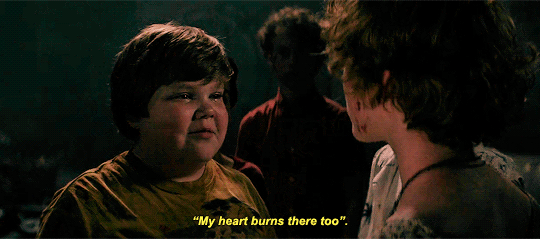January Embers, Part I: The Poem That Becomes the Shared Language of Horror Flick IT (2017)
Stephen King has been writing poetry just as long as he's been writing fiction. But none of his poems have been as successful as the mangled little haiku at the heart of It and its film adaptations.
Happy Halloween! This is the second of four spooky posts I’m running this month a PopPoetry. Today I’m taking a look at one of the best horror adaptations and remakes in recent memory: the 2017 reboot adaptation of Stephen King’s It.

It’s quotable, it’s terrifying, it features a mind-bending performance by Bill Skarsgård, and it uses extremely rational fears as the foundation of its message. Sure, the killer clown is the figment of an overactive childhood imagination (or rather, the twisted overactive imagination of adult Stephen King) but the book and the film also touch on disease, abuse, death, loss—and, of course, fear—in broad but affecting ways.
And at the heart of the book and film is, lucky for us, a love poem. This poem, penned by King himself, is unexpectedly rich and comes to function as a kind of shared language between the group of young protagonists.
The Poem and the Plot
Beverly Marsh (Sophia Lillis) is the sole female character in the book and in the films. This sucks, but what sucks even more is the insane objectification of Bev as a mere signifier of sex and adulthood in the book. Thankfully, none of the screen adaptations have retained the most poorly conceived and disturbingly misogynistic plot points that sprung from King’s brain in the novel.
Bev is an object of fascination for the group of boys known as “The Losers” in 1980s Derry, Maine. Cool, confident, beautiful, and made mature by a tidal wave of pain, she’s irresistible. The films still don’t do her justice, but Lillis’ performance of a fairly flat character written by a man who is content to use her as a mere plot tool is quite luminous.
Most of the boys are captivated by her, but a kind of love triangle forms between Ben (Jeremy Ray Taylor), Bill (Jaeden Martell), and Bev. Teased for being a bigger kid, Ben uses his brain to woo Bev, and heads to the library to write and read in solitude, even though summer break has started. He pens a poem to Beverly on a postcard but doesn’t sign his name, opting instead to sign it as a “Secret Admirer.”
Ben sneaks the postcard into Bev’s backpack. When she reads the poem, Bev is captivated. A love poem from a secret admirer? Teenage me would have died on the spot.
It’s a nice little poem, and has the brevity and imagistic punch of a haiku, though not its structure. Fascinatingly, Ben or some PA or whoever on the set actually wrote in the line breaks with a forward slash (/) on the postcard. I can’t stop thinking about how interesting this is.
If you have no idea what I’m talking about, forward slashes are used to indicate where one line of poetry stops and another begins when you can’t or don’t want to physically create the white space. Take these lines:
January embers
my heart Burns there too
They become “January embers / my heart Burns there too” when using this form of notation. But since he has the opportunity to simply write the poem with the line breaks on the postcard, the forward slashes are unnecessary… or are they? They do show a pretty thorough knowledge of poetry for someone so young. They also have the effect of making the lines quite clear. The line has been variously defined by poets over the centuries, and some favorite descriptions refer to it as a unit of breath or a unit of thought. Here, Ben is making clear that “Your hair is winter fire” is one unbroken thought, and so is “January embers.”
If you follow Ben’s line break marks and not the actual line breaks necessitated by the centerline of the postcard format, you get a 6-6-5 syllabic structure (6 syllables in the first and second lines and 5 in the third), sort of like a haiku with an extra syllable that has crept into the first line from the second line. It gives the poem a kind of off-kilter originality that still feels final once it’s over.
Transcribing Ben’s exact handwriting on the postcard—capitalization and line breaks and all—results in this:
Your hair is
Winter Fire /
January embers /
my heart Burns
there too
It’s childlike but also mature in perplexing ways. In the 1986 novel on which the film is based, the poem is lineated and punctuated in a more traditional way. What’s more, we’re treated to a bit more of the inner workings on Ben’s mind as he considered what kind of poem to write and what purpose the form he chose served.
Enjoying PopPoetry? Subscribe now to see it in your inbox weekly. You’ll float, too!
The poem is featured in the 1990 miniseries that scared the shit out of me as a kid (thanks, Tim Curry!) too, and becomes tinged with horror in both cases. Bev’s father finds the postcard with the poem written on it and assumes that the amorous lines were written by a boy who has slept with her. This is how dangerous female sexuality is to the fragile male ego, the paternal abuser, and men more broadly: even a haiku about hair is a threat.
Later, in It: Chapter Two (2019), the poem’s effects on Bev, Ben, and Bill are still echoing.
“January Embers?” What the Hell Does That Mean?
We get a few hints about what the character Ben was thinking when he penned the poem, thanks to the description King offers us in the passage above. It’s an interesting concept: a writer writing about someone writing. By definition, then, King is also cluing us into how his mind worked when writing the poem that the character Ben is writing.
Meta.
Anyhow, Ben starts with Bev’s hair and lets the image linger in his mind. Hair is often the subject of romantic language aimed at women, and particularly by men. Understood to be a symbol of virility, health, and sometimes femininity (a distinction that has changed shape with the times, hair is, frankly, sexual. When we let our hair down, we are sometimes signaling our openness, looseness, or desire.
This is part of the reason that Bev cuts her long hair with scissors after her sexually abusive father touches it “lovingly” in a threatening moment. Short-haired Bev is taking what little control she can over her fear, represented by Pennywise the Clown and other metaphors on screen.

But even her shorter red hair is magnetic to Ben and the other Losers. It forms the main focal point of the poem Ben writes on the postcard but eventually morphs into a symbol of desire itself.
“Your hair is winter fire” is a nice little line because of its unexpected image and the directness of its metaphor. Winter fire… what is it, exactly? In my mind, a winter fire is one whose colors are set off against the whiteness of snow: a fire that is set in the winter, one that is much desired because of the warmth it provides in a cold environment.
The phrase “January embers” is a restatement of the first line in even more imagistic and specific terms. “January” is a specific winter month, and “embers” are a specific part of a fire: the heart of the fire, really. Nice work, kid… er, King.
The final line, “My heart burns there, too” is more overt in its meaning but also sly: that little “too” hanging onto the end is doing no small amount of work. The speaker is saying that his heart burns in her hair or for her hair, but also in and for, ostensibly, other parts of her. It’s spicy stuff. A total paraphrase of the poem might be Your hair reminds me of the burning desire I have for you.
The poem is way better, as it always is, and says more than any deflated statement like my explanation could. This is the power that poetry has: to say multiple things at once, overlapping in a single, unbroken voice.
Poetry as a Shared Language
More than once throughout the film, a character utters the phrase “January embers” to illustrate their selfhood, their intentions, and more.
It becomes a kind of catchphrase that ends up meaning “Yes, it’s me” or “Oh, it’s you” or “I remember.” This becomes true, as we’ll see next week, for the adult characters in the sequel, too.
Reading poetry can have that effect as well—not just writing it. It can be a kind of emotional and rhetorical shorthand that packs a punch in just a few words.
More to come next week in January Embers: Part II.
Related
P.S.
Like my post about Letterkenny’s love of the abecedarian, Brian Phillips examines the profane wordplay of Succession as a kind of gymnastic poetic feat. The show not only sounds almost poetic but also makes references to poets and poetry in its script (and its episode titles! Thanks to reader Amy Sailer for pointing this out). Read Phillips’ review at The Ringer. Stay tuned for a full post on Succession, too!
Queen of all things punk and poetry Patti Smith continues to thrill audiences with her blend of spoken word and song, most recently wowing concertgoers at the Royal Albert Hall.
A recent episode of Ted Lasso ended with a song by Molly Drake, who was also a poet. She also just so happened to be the mother of genius, gone-too-soon English singer-songwriter Nick Drake. Dying to get my hands on the rare book and CD set that was released of her work in 2017.







